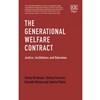genrationer

A welfare state for all generations
In a society there are always several generations co-existing and they all need different things from the welfare state. This result is a conflict between generations on who should be favored by publi by , Tommy Ferrarini, Kenneth Nelson and Joakim Palme.
Population Aging And The Generational Economy
Chapter 23 Intergenerational redistribution in Sweden’s public and privat sectors By the book here: http://www.e-elgar.com/Print_product_detail.lasso?id=13816 Population Aging and the Generational Econom
The Generational Welfare Contract: Justice, Institutions and Outcomes.
Cheltenham: Edward Elgar (Forthcoming, Publication in August 2017). This groundbreaking book brings together perspectives from political philosophy and comparative social policy to discuss generational

Befolkningen är framtiden
Befolkningens åldersfördelning är avgörande såväl för de tillgängliga resurserna som vilka behov som behöver tillfredställas. Detta kan användas för att klargöra vilka framtider vi kan välja och vad d

Hur påverkar släktbakgrund livschanser i dagens Sverige?
Kortföreläsning med Martin Kolk, docent i demografi vid Stockholms universitet och Institutet för framtidsstudier. Visste du att du kan ha mer gemensamt med dina fjärdekusiner än med dina syskon? Här

Future generations
Climate change is the biggest challenge of our time, and in this theme there is a focus on future generations and their living conditions. We aim to examine among other things climate ethics, sustainable development, green growth, obstacles to climate action and social dilemmas.

Moraliska avvägningar vid COVID-19 åtgärder
Orri Stefánsson, docent i praktisk filosofi. När ett samhälle står inför en kris som COVID-19 går det inte att komma undan svåra moraliska avvägningar, där till exempel framtida generationers intr
Discrimination and Future Generations
In: Mosquera, J. & O. Torpman (ed.),Studies on Climate Ethics and Future Generations vol. 6. Working Paper Series 2024:10–17 Abstract In this paper, I analyse whether the present generation’s choices. This has been tentatively suggested in both legal theory and philosophy; I review such suggestions briefly in section 1. However, a more rigorous analysis – outlining the concept, relevant grounds, and wrong-making features of discrimination, and applying these to future generations – is still lacking. To address this lacuna, I propose a theory of discrimination and analyse why it might seem to apply – yet ultimately fails to apply – to the differential treatment of future generations. More specifically, I propose a definition of discrimination (section 2.1) and an account of the moral wrongness of discrimination (section 2.2). I moreover explore the connection between discrimination and theories of social (in)justice (section 2.3). I then apply this theory to the problem of differential treatment of future generations. While discrimination may occur between collectives, such as generations (section 3.1), my analysis shows that the specific temporal status of future generations is not comparable to other grounds of discrimination, such as gender or race (section 3.2). Moreover, due the non-identity problem and the problem of lack of a “community of social meaning” between generations, future generations cannot be claimed to be subjected to worse treatment by the present generation (section 3.3). Hence, their differential treatment due to the present generation’s choices does not amount to discrimination. Section 4 concludes and outlines some upshots of my analysis.

Climate Change and Future Generations
What we do - or fail to do - about climate change now will impact the lives of billions and billions of people in the future. What is the right thing to do? This animated short film highlights the cho
Constructivist Contractualism and Future Generations
In The Oxford Handbook of Intergenerational Ethics, Stephen M. Gardiner (ed.), s. C36.S1 - C36.N20. Abstract In constructivist contractualist theories, such as Rawls’, principles of justice should mirror








